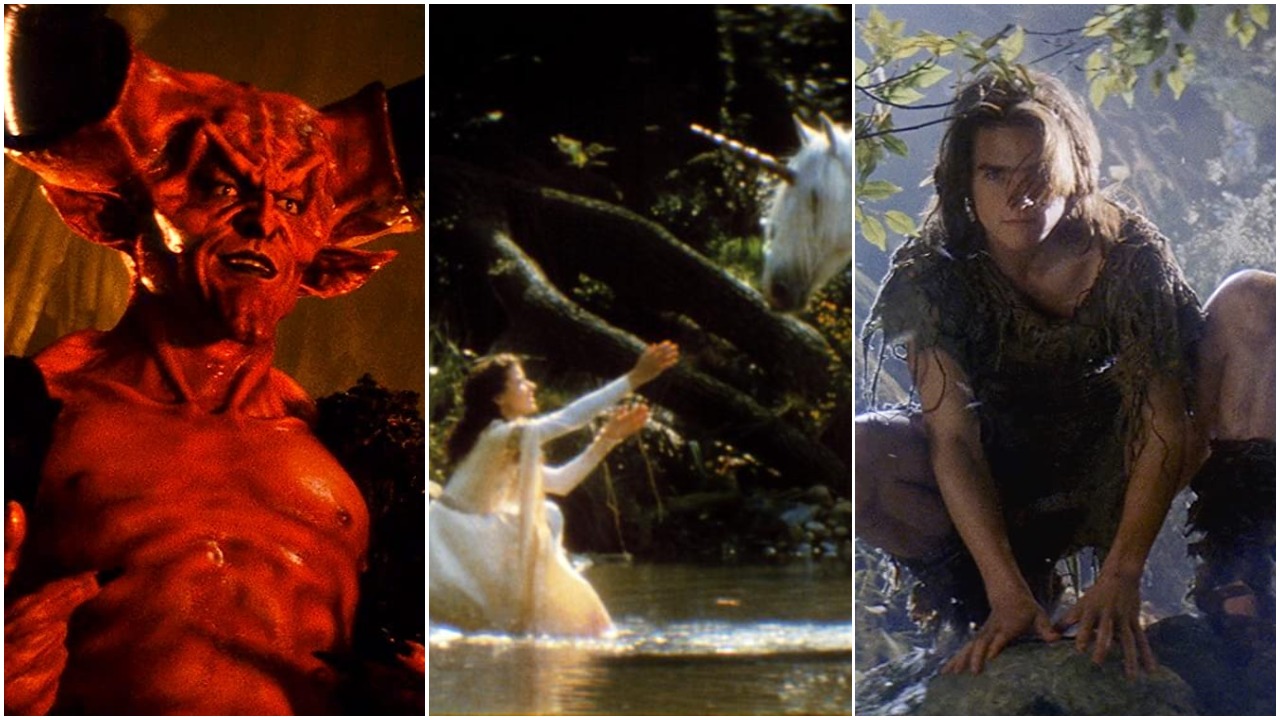Let’s Talk About Legend, One of the Best Terrible Fantasy Movies of All Time

There were a lot of great, weird fantasy movies in the ’80s. From the creepy, thoughtful animation of Rankin Bass’s The Last Unicorn, to the magic (dance) of Labyrinth, to the weirdness of Krull. But I don’t think any movie better represents the successes and failures of ’80s fantasy better than Ridley Scott’s 1985 mega-flop Legend.
Legend was supposed to be big. It starred Tom Cruise, hot off his star-making turn in Risky Business, and was the follow up to Ridley Scott’s hugely influential Blade Runner (which came after another iconic work, Alien). Legend was conceived as a post-modern fairy tale, but endless studio tinkering changed Scott’s vision for the film and turned it into something else.
Filming was a nightmare and the studio burned to the ground in the middle of it. The final film would end up savaged by critics and rejected by audiences, making just $15 million on a $25 million budget. It was generally seen as the film that ended giant fantasy movies until the Lord of the Rings in 2001.
Legend is an incredibly weird movie. It’s so earnest in a lot of ways, telling a story of fairies, goblins, unicorns, and a pants-less Tom Cruise without a hint of the irony or self-awareness that we’re used to nowadays. It’s like a picture book from a time when you couldn’t read. It’s a movie of visual impressions and wafer-thin characters that look amazing but make little sense, but for this movie to be fun, they don’t really have to. But it’s not clear is “fun” is what this movie was going for.
It’s generous to say the plot of Legend is thin. A Princess (Mia Sara) named Lilly is dating (I think) Jack (Tom Cruise), who is a forest child. No, we never find out why he’s living in the forest or how he met the princess. On the day that the unicorns are visiting the forest, Jack takes Lilly to see them and she touches one … allowing the Goblin minions of the Lord of Darkness (Tim Curry) to attack the Unicorns and the world turns to winter. One Unicorn is killed or maimed (again, unclear), but the other needs to be killed too.
Jack and Lilly have to, separately, fix this mess. Jack has help from a bunch of fairies (who are kinda assholes) and Lilly ends up kidnapped along with a Unicorn mare, by Darkness, and given an extreme makeover. She doesn’t entirely succumb though and helps Jack free the unicorn and to defeat Darkness. Kinda. I think?
The original draft of Legend was much darker (if that’s possible). Lilly was supposed to transform into a monster of some kind and literally have sex with Darkness, but a studio exec (wisely) told Scott and screenwriter William Hjortsberg, “You can’t have the villain fuck the princess.” In the version that made it to theaters, Lilly just gets goth and sexy and kind of seduced by Darkness.
But can you blame her? Tim Curry as Darkness is the flat-out highlight of the film. Of course, Tim Curry is usually the highlight of every film he’s in, but this performance is the epitome of Curry’s signature mixture of camp and menace, all the more impressive due to the fact he’s acting under pounds of makeup and prosthetics.
Everything about Darkness, the character, is a microcosm of Legend. He’s a triumph of visuals and execution, but when you think about who he is or why he’s doing anything, it doesn’t really make sense. Is he the devil? Or is he the devil’s son? Or something else? And if you think more deeply, the character was clearly meant to be something much darker and more disturbing.
This was supposed to be a movie about how actual legends often express something much darker and primal in human nature. The movie that made it to release, however, only hints at those ideas, mainly in Lilly’s confusing storyline where she’s both selfish and sexualized, seduced and a savior. Lilly ends up being every hollow trope about female evil and weakness, without much to redeem her beside one act of defiance.
The same flimsiness applies to Jack. Just like he wears armor with NO PANTS, he’s the idea of a character or archetype on top with nothing underneath it.
And yet, somehow, Legend is still so much fun to watch. It’s a visual feast, a truly grim fairy tale. It’s not about character or story or any of that, it’s about dreams and fantasy and the attraction of the mere idea of magic and legends itself. I know I’m not alone in loving this movie when I was young. And I still dig it.
For one, there wasn’t much else available in terms of fantasy films available and this one, in particular, felt like it was always on cable. It was pretty and silly and fuel for my imagination. I didn’t need it to be more—it was enough that it was cool-looking and magical. It’s fascinating to re-watch now, and still enjoyable. Along with Willow and Labyrinth, it’s one of the defining fantasy films of my young life and I think it still will continue to be that for generations more.
Legend is a disaster in a lot of ways, but it’s an attractive one that’s a lot more fun than many other serious movies. It’s the kind of disaster that doesn’t get made anymore, and that makes it, well … legendary.
(images: Universal)
Want more stories like this? Become a subscriber and support the site!
—The Mary Sue has a strict comment policy that forbids, but is not limited to, personal insults toward anyone, hate speech, and trolling.—
Have a tip we should know? tips@themarysue.com